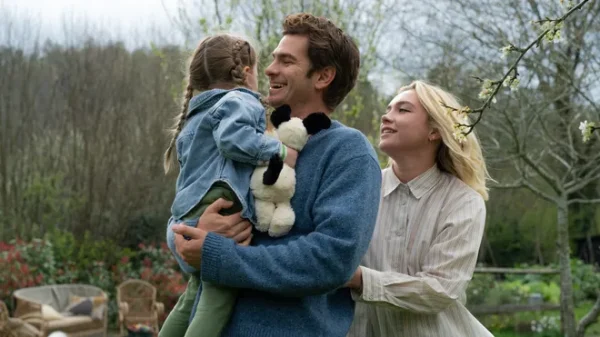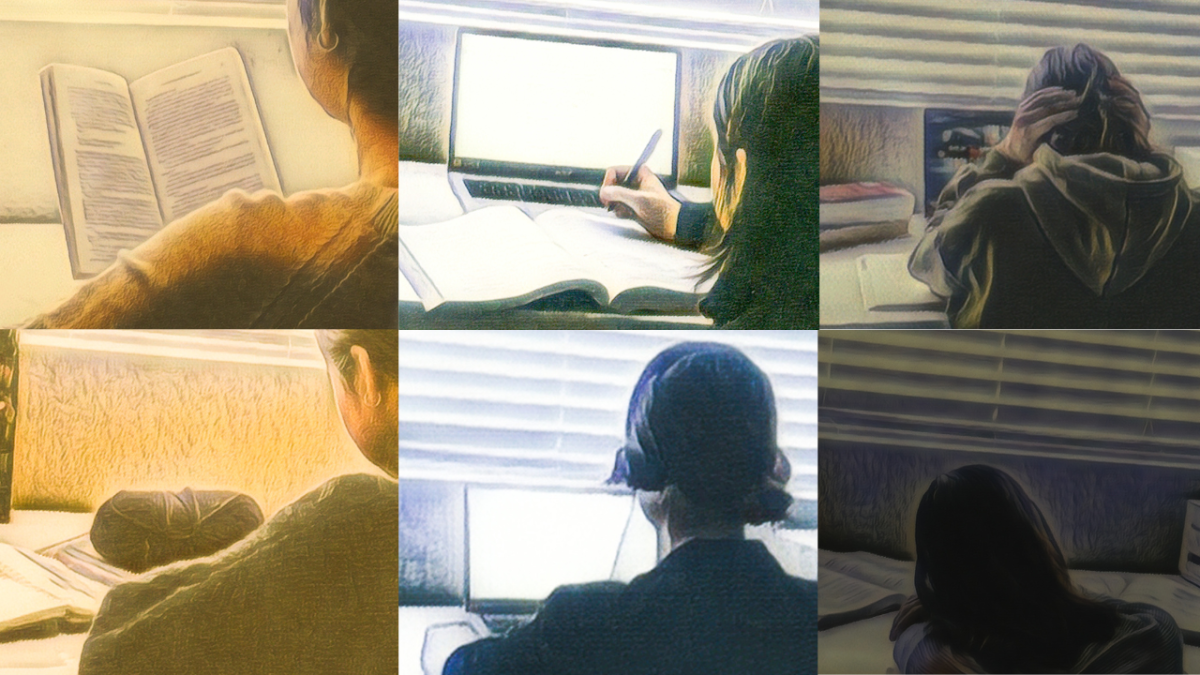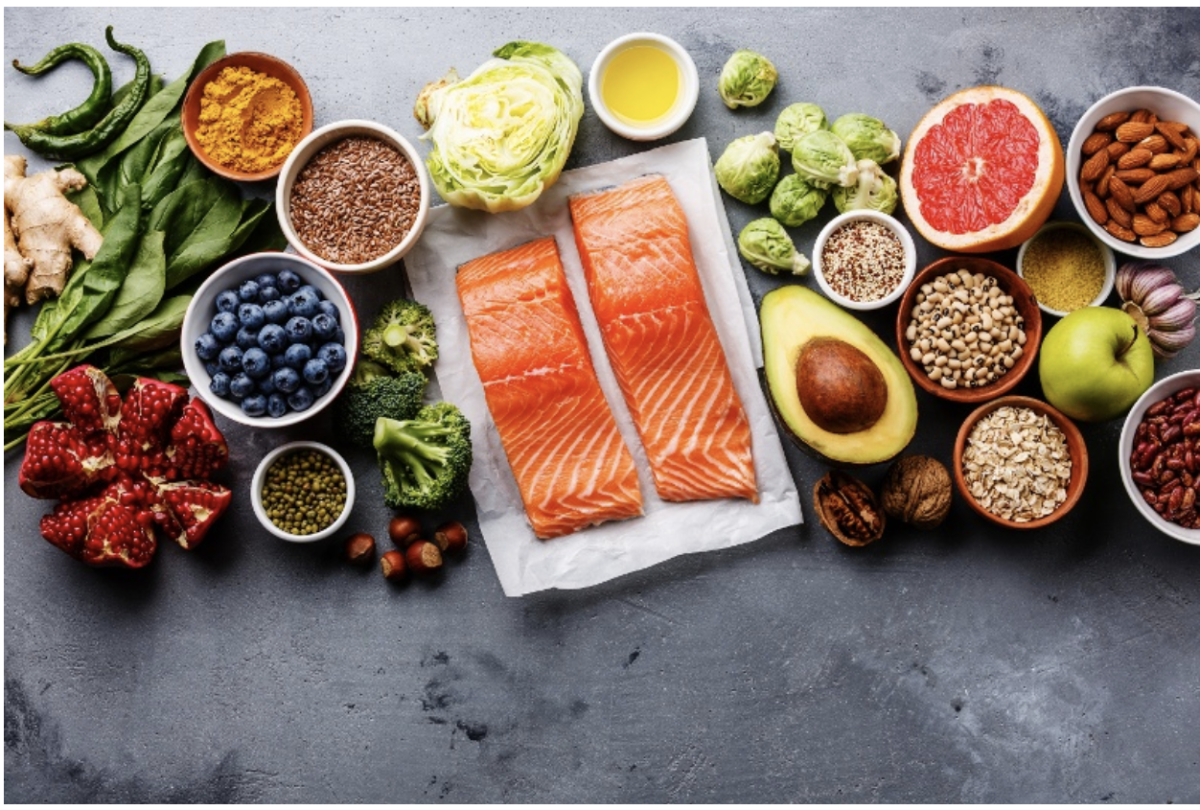
The movie We Live in Time was released in the United States on October 11, 2024. Starring Florence Pugh and Andrew Garfield, Almut (Florence Pugh) and Tobias (Andrew Garfield) learn to cherish every moment they have left together, as the film centers around Almut’s long and emotional battle with cancer. Throughout the film, Pugh and Garfield’s pure chemistry and connection are authentic and hold the story together. Joshua Willerer (11) states that he “hopes to see the film soon because [he loves] both Florence Pugh and Andrew Garfield as actors.” As the film opens, the audience is shown a clip from the past when Almut and Tobias are close to delivering their first and only child. The film continues to alternate between this timeline, an earlier timeline of Almut and Tobias’ first meeting, and lastly, a timeframe in which Almut is tragically fighting cancer.
When Almut and Tobias first meet, Almut is a happy independent woman who doesn’t want to put her whole life on hold to start a family. On the other hand, Tobias longs for a more traditional lifestyle, hoping to get married and eventually have children. Realizing he is slowly falling in love with Almut, Tobias expresses their difference, hoping she may understand his desire to start a family together. Instead, Almut defensively shouts back at him, offended he would expect this type of commitment and even ask her questions like this so early on in their relationship.
Yet, as time passes, Almut begins to yearn for a family of her own. After being diagnosed with cancer, Almut decides to save her eggs, in the hopes of one day having children with Tobias. This moment symbolizes a huge step in their relationship, as Almut falls deeper in love with Tobias and decides that despite never wanting children with him, she does want a family. This beginning of their love story is beautiful and innocent, and well blended into the two later timeliness of the film. These early stages of their relationship seamlessly intertwined with the more current plot, adding a profound sense of nostalgia and heartbreak. The light and exciting early moments sprinkled throughout the devastating later ones perfectly balance the heaviness and love of their relationship.
In the second timeline, Almut delivers the baby they had been hoping and praying to be able to have. On the way to the hospital in horrible traffic, the two leave their car and take a quick pit-stop at the gas station for snacks. Completely unplanned, Almut cannot help but start pushing into the gas station restroom. In this scene, the writer tries to bring levity through a comedic, almost sitcom-like scene. The audience witnesses the child’s beautiful yet unglamorous birth, making Almut and Tobias’s story so real and so human.

Lastly, the couple’s final timeline: the present. Although Almut and Tobias have a somewhat unconventional relationship– they are unmarried with a young child they raise together– they live almost as if they are married. When Almut is diagnosed with stage 3 ovarian cancer for the second time, their doctor is not as optimistic as the first. Instead of undergoing a much more extensive treatment, Almut decides to truly enjoy and live to the fullest in her potential last six months of life. Almut decides to have meaningful, intentional, and fulfilling moments before her almost inevitable death.
Shortly after hearing this devastating news, Tobias proposes, hoping to publicly display their deep love before losing Almut. In these challenging and complex last months of Almut’s life, she struggles to balance motherhood with her sense of worth. She hopes to leave her daughter with something to remember her by– something of value that her daughter can be proud of once she is gone. So, she decides to enroll in a European cooking competition, hoping to prove to herself and her family that her life was at least worth something.
When he discovers the cooking competition Almut hid from him, Tobias is furious. He feels that she is risking her health by undergoing so much stress, hoping to find meaning in what he views as a meaningless competition. However, seeing that she needs to do this before she passes, Tobias supports her unconditionally.
In this penultimate scene of the film, Almut prepares to take the stage for this national competition. As she frantically rushes to complete her dish on time, Tobias and their daughter emotionally cheer her on from the audience. Once she is complete, the screen goes silent, in a surreal and unexplainable moment of certainty in Almut. She marches off the stage, and into the arms of her family.
In a beautifully, heartbreaking, metaphorical ending, Almut embraces her family, who has watched and supported her through the most difficult ups and downs. They skate happily, in an empty rink: a moment of pure joy and innocence. As Almut happily waves goodbye to Tobias and their daughter, she skates away gracefully, with a calm content glow within her. This moment of her skating away is touching and profound, as if she has left the physical world behind.
The writer’s choice to show her death as a metaphor instead of how she actually passed away adds an emotional and almost poetic aspect to the film. Conclusively, this movie successfully depicts a heartbreaking and tragic love story about tradition, passion, inner contentment, and deep unconditional love, as Almut and Tobias learn to love one another even past physical life on Earth.
Students at Yorba Linda High School may be able to relate to Almut and Tobias’s story, as many have loved ones who are dealing with or have dealt with cancer or other potentially terminal illnesses. Emma Guastaferro (11) recounts We Live in Time as “a well-done movie that may connect many families who have gone through similar things.” This beautiful story has touched my heart and can resonate with many others in our community.


























